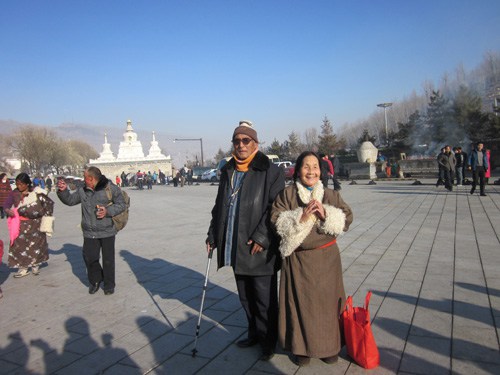|
 |
|
PIETY: Believers pray outside the Grand Golden Tiled Hall at the Tar Monastery (PAN XIAOQIAO) |
Since its introduction to the region in the seventh century, Buddhism has become deeply rooted in the culture of the local people of the Qinghai-Tibet Plateau, particularly among the Tibetan ethnic group. All practitioners and believers consider themselves followers of the teachings of the Buddha, Sakyamuni.
Located mostly on the Qinghai-Tibet Plateau, Qinghai Province has an ethnic Tibetan population of more than 1.37 million. Religious activities in Qinghai are rich in their content and diverse in form, and are also protected by the government in accordance with the law.
A holy place
Famous for the three important Buddhist art forms—murals, embroidery and butter sculptures—the Tar Monastery boasts a unique status in China's Buddhist culture.
Located 25 km to the southwest of Xining, Qinghai's provincial capital, the monastery was built in 1379 to commemorate Tsongkhapa, founder of the Gelug (Yellow Hat) sect, which is one of the four major sects of Tibetan Buddhism.
The monastery attracts a large number of tourists every year. It is a sacred place for practitioners of Tibetan Buddhism who come to worship, study or participate in religious activities.
 |
|
DEVOUT BELIEVERS: Godain and his wife come to the Tar Monastery to worship Buddha every day (PAN XIAOQIAO) |
Godain, 72, and his wife moved to Huangzhou County, where the Tar Monastery is situated, several years ago, so that it would be convenient for them to come to pray and worship here every day, and so they would never miss any Buddhist activities, large or small.
According to Godain, he became a follower of Tibetan Buddhism when he was very young, and his biggest wish for his later years is to come to the monastery every day to pay homage to Buddha.
Aside from believers like Godain, every year the Tar Monastery also receives a number of monks from other temples, who come to study and cultivate themselves. These visiting monks are allowed to stay for a certain period of time after registering with the monastery's management council by presenting their own temples' letter of introduction. They don't need to pay any fees and are free to choose when to come and when to leave.
Roger Shouse, a professor of education at Penn State University in the United States, visited the Tar Monastery during his recent travel to China. Roger said, "I appreciate it [Buddhism] very much and I like to study it. I think there is much we can all learn. It helps a person develop some peace."
A Christian himself, Shouse thinks there is a lot of similarity between Christianity and Buddhism. He said that he enjoys learning about these connections.
Shouse added that although the Tar Monastery is a famous tourist destination, upon visiting it he got a real sense that it is not just for tourists and that it was a place where practitioners could really express their faith.
Eng Keng Chhun, a tourist from Cambodia, said that he had long admired the Tar Monastery and was very excited to come. "It is exciting to experience a Buddhist culture that is different from that of my country," he noted, adding that he feels that the Chinese Government is doing well in protecting Buddhism and its culture in China.
| 